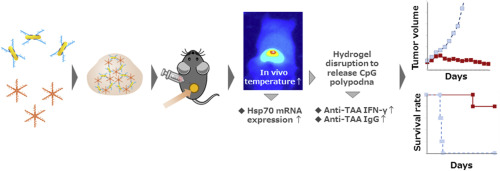当前位置:
X-MOL 学术
›
Biomaterials
›
论文详情
Our official English website, www.x-mol.net, welcomes your
feedback! (Note: you will need to create a separate account there.)
DNA nanotechnology-based composite-type gold nanoparticle-immunostimulatory DNA hydrogel for tumor photothermal immunotherapy
Biomaterials ( IF 12.8 ) Pub Date : 2017-09-09 , DOI: 10.1016/j.biomaterials.2017.09.014 Tomoya Yata , Yuki Takahashi , Mengmeng Tan , Hirotaka Nakatsuji , Shozo Ohtsuki , Tatsuya Murakami , Hiroshi Imahori , Yuka Umeki , Tomoki Shiomi , Yoshinobu Takakura , Makiya Nishikawa
Biomaterials ( IF 12.8 ) Pub Date : 2017-09-09 , DOI: 10.1016/j.biomaterials.2017.09.014 Tomoya Yata , Yuki Takahashi , Mengmeng Tan , Hirotaka Nakatsuji , Shozo Ohtsuki , Tatsuya Murakami , Hiroshi Imahori , Yuka Umeki , Tomoki Shiomi , Yoshinobu Takakura , Makiya Nishikawa

|
Success of tumor photothermal immunotherapy requires a system that induces heat stress in cancer cells and enhances strong anti-tumor immune responses. Here, we designed a composite-type immunostimulatory DNA hydrogel consisting of a hexapod-like structured DNA (hexapodna) with CpG sequences and gold nanoparticles. Mixing of the properly designed hexapodna and oligodeoxynucleotide-modified gold nanoparticles resulted in the formation of composite-type gold nanoparticle-DNA hydrogels. Laser irradiation of the hydrogel resulted in the release of hexapodna, which efficiently stimulated immune cells to release proinflammatory cytokines. Then, EG7-OVA tumor-bearing mice received an intratumoral injection of a gold nanoparticle-DNA hydrogel, followed by laser irradiation at 780 nm. This treatment increased the local temperature and the mRNA expression of heat shock protein 70 in the tumor tissue, increased tumor-associated antigen-specific IgG levels in the serum, and induced tumor-associated antigen-specific interferon-γ production from splenocytes. Moreover, the treatment significantly retarded the tumor growth and extended the survival of the tumor-bearing mice.
中文翻译:

基于DNA纳米技术的复合型金纳米颗粒免疫刺激DNA水凝胶用于肿瘤光热免疫治疗
肿瘤光热免疫疗法的成功需要一种在癌细胞中诱导热应激并增强强大的抗肿瘤免疫反应的系统。在这里,我们设计了一种复合型免疫刺激DNA水凝胶,该凝胶由具有CpG序列的六足类结构化DNA(hexapodna)和金纳米颗粒组成。适当设计的六足体和寡聚脱氧核苷酸修饰的金纳米颗粒的混合导致形成复合型金纳米颗粒-DNA水凝胶。水凝胶的激光辐照导致六足核的释放,六足核可有效刺激免疫细胞释放促炎性细胞因子。然后,EG7-OVA荷瘤小鼠接受瘤内注射金纳米颗粒-DNA水凝胶,然后在780 nm处进行激光照射。该处理增加了肿瘤组织中局部温度和热休克蛋白70的mRNA表达,增加了血清中肿瘤相关的抗原特异性IgG水平,并诱导了脾细胞中肿瘤相关的抗原特异性干扰素-γ的产生。此外,该治疗显着延迟了肿瘤的生长并延长了荷瘤小鼠的存活期。
更新日期:2017-09-09
中文翻译:

基于DNA纳米技术的复合型金纳米颗粒免疫刺激DNA水凝胶用于肿瘤光热免疫治疗
肿瘤光热免疫疗法的成功需要一种在癌细胞中诱导热应激并增强强大的抗肿瘤免疫反应的系统。在这里,我们设计了一种复合型免疫刺激DNA水凝胶,该凝胶由具有CpG序列的六足类结构化DNA(hexapodna)和金纳米颗粒组成。适当设计的六足体和寡聚脱氧核苷酸修饰的金纳米颗粒的混合导致形成复合型金纳米颗粒-DNA水凝胶。水凝胶的激光辐照导致六足核的释放,六足核可有效刺激免疫细胞释放促炎性细胞因子。然后,EG7-OVA荷瘤小鼠接受瘤内注射金纳米颗粒-DNA水凝胶,然后在780 nm处进行激光照射。该处理增加了肿瘤组织中局部温度和热休克蛋白70的mRNA表达,增加了血清中肿瘤相关的抗原特异性IgG水平,并诱导了脾细胞中肿瘤相关的抗原特异性干扰素-γ的产生。此外,该治疗显着延迟了肿瘤的生长并延长了荷瘤小鼠的存活期。











































 京公网安备 11010802027423号
京公网安备 11010802027423号